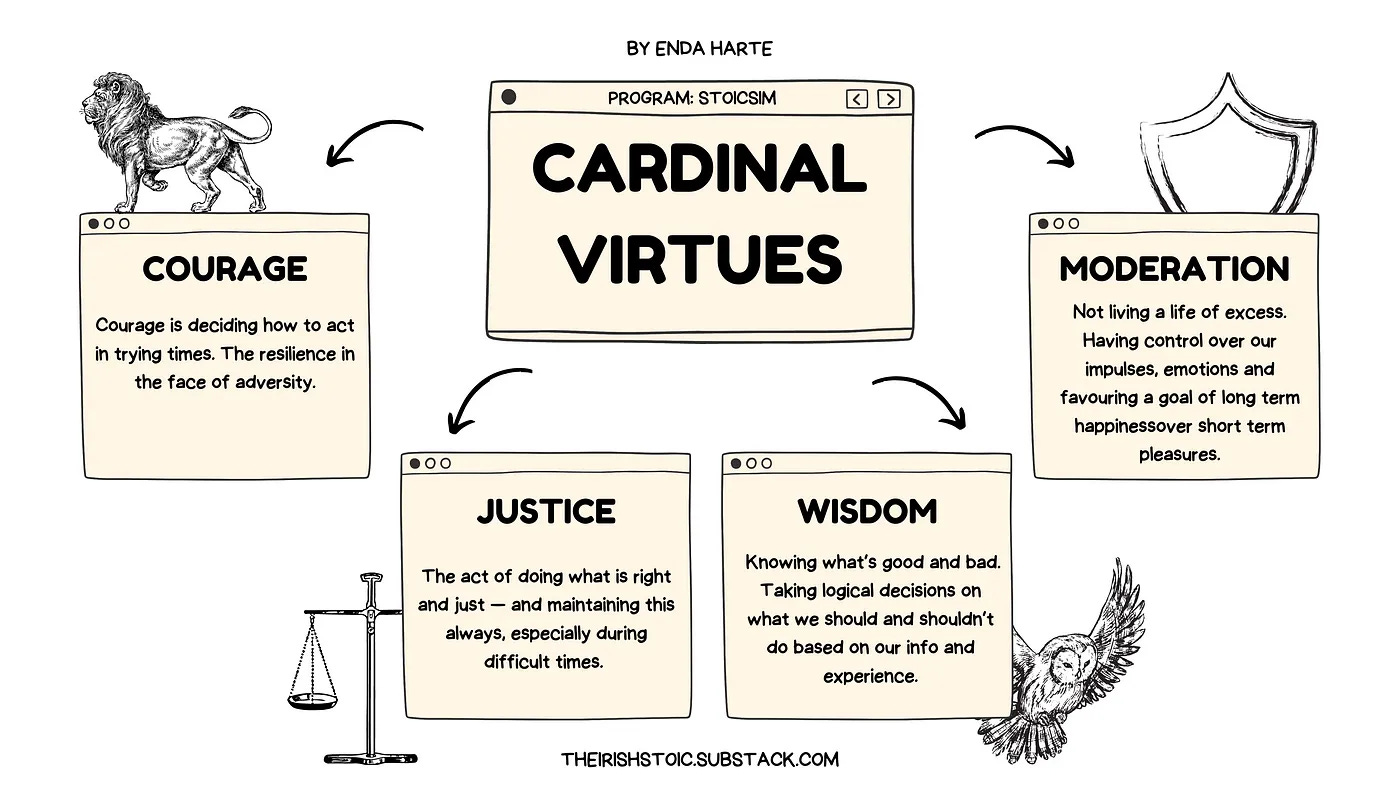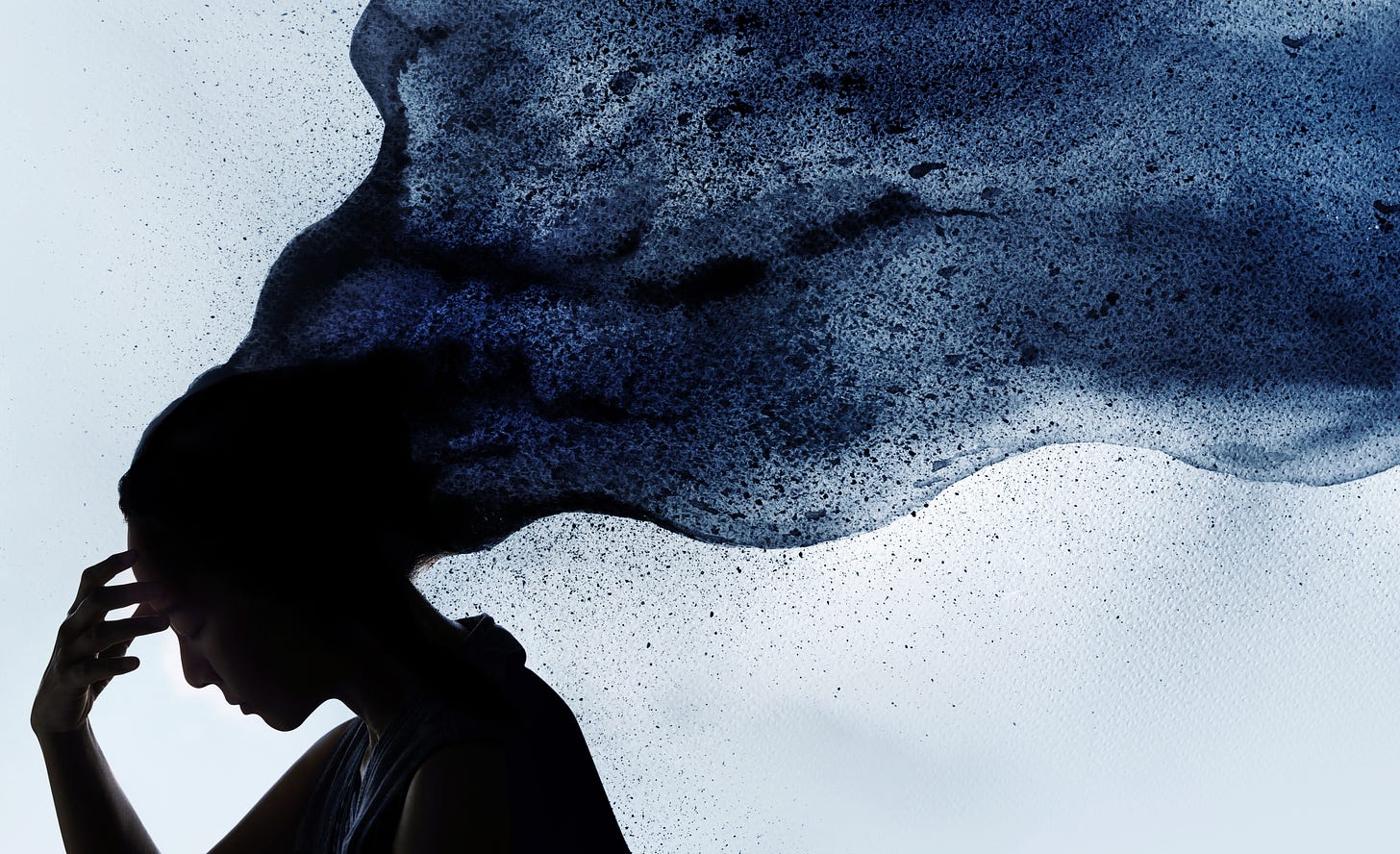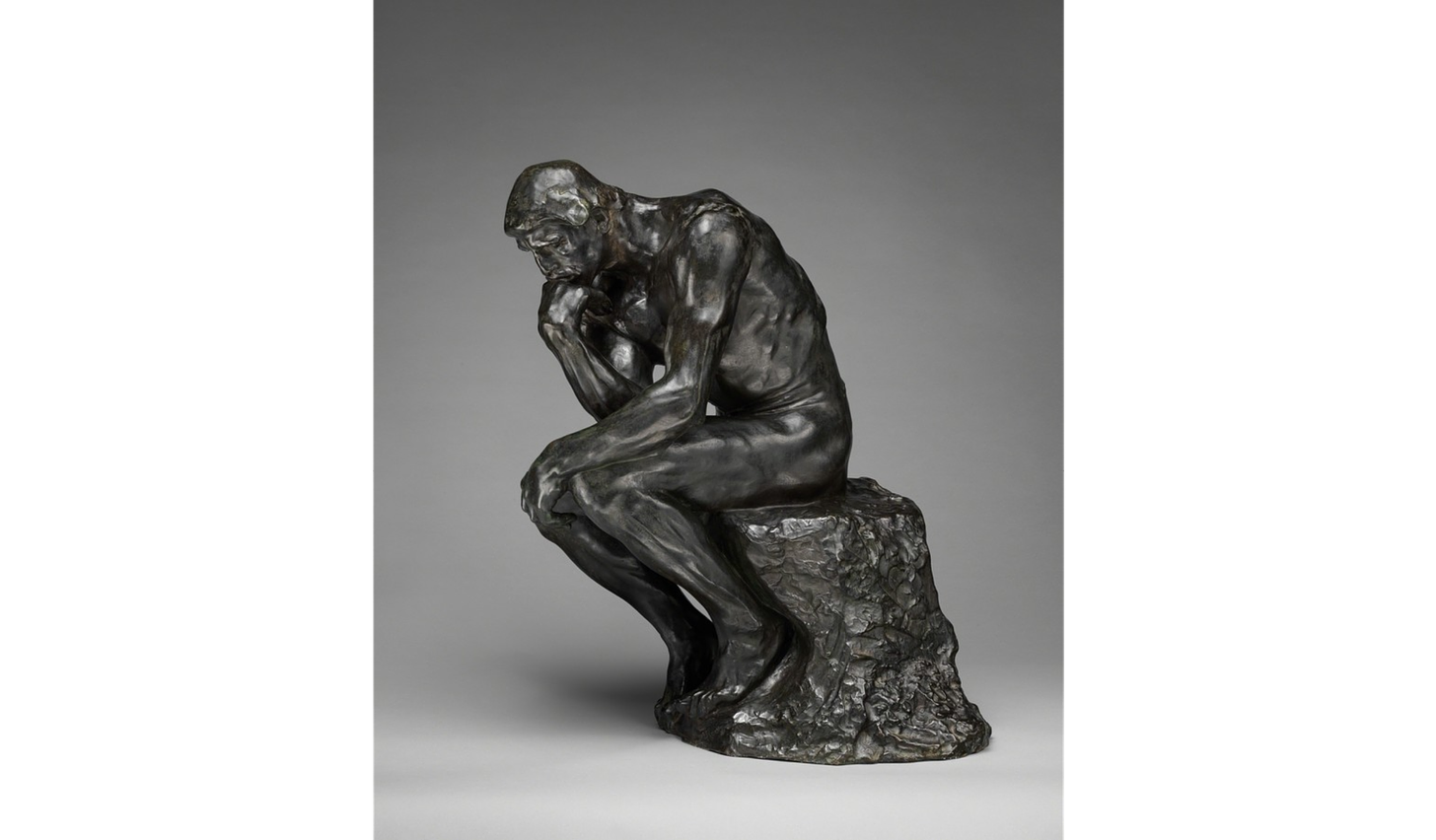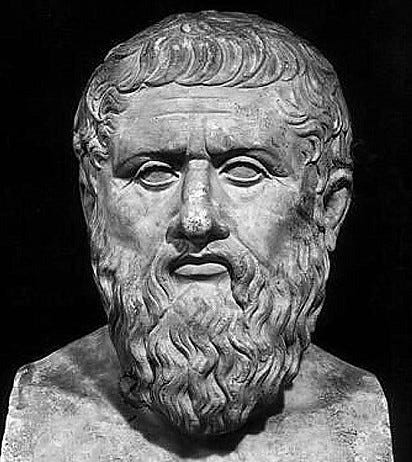How I beat depression
A good life is impossible without courage, wisdom, justice and temperance.
Content warning: critiques of critical social justice culture and modern feminism.
A hollow Self
I feel compelled to write about this topic because I see so many women around me suffering from poor mental health like I have. I want to try to lay bare some components of contemporary culture that discourage self-reflection and encourage mental illness. It’s not just the phone or social media; it’s how they lead us to see ourselves and the concerns they reinforce for women over what we ought to be concerned with - cultivating virtues necessary for a life well lived. The good life, for me, was impossible. Instead, self-development in popular parlance has come to mean turning inward and doing whatever makes you happy even if it’s to your and others’ detriment in the name of personal liberation, which often leads to self-centered behavior. At the same time, you’re cultivating your identity online as a depressed person along with myriad other labels we find on these platforms.
Therapy permitted me to wallow in my disempowerment despite claiming to be healing, and my therapist adheres to the social justice paradigm. I may have helped push her in that direction over the ten years I was seeing her by her admission - something I deeply regret now. One of our last conversations involved me questioning whether the nebulous force of patriarchy can be said to exist for women like me in the most liberated society in history, and she insisted it did. That was when I decided I was done with the disempowerment of the therapeutic couch.
I studied the humanities, social sciences, anthropology, and religion, which all have intersecting intellectual threads. The theoretical currents tying all these disciplines were those we now see in the culture as intersectionality, the social construction of race and gender identities, and the rhetoric of anti-colonialism and anti-capitalism. During college and grad school, I got sucked into the social internet and stopped reading after I finished my degree. It took me a decade to start again, and I don’t think I was a real person back then with defensible views, because I had never intellectually tested them and lived in an echo chamber.
I’m not even sure who I was in the decade that I wasn’t reading at all.
The self-indulgent culture of online leftism
I was a shell of a person, and I made bad decisions about relationships, friendships, and self-control. In other words, I succumbed to the hedonism of youth, intertwined with a culture telling me I am a hapless victim. That was also the worst period of depression, but I now realize overuse of social media, news consumption, and the loss of reading were all related to this seemingly intractable condition. If nothing else, these factors all made it worse and near-impossible to pull me out, because the news and internet media foment negative emotions and encourage seeing depression as an identity. One need only look to corners of Instagram and TikTok to see how far we’ve fallen.
In retrospect, I cannot believe I let advertising platforms define so much of myself, preventing reaching a higher self. The best thing we can do as women is to get off of these platforms and read non-fiction. Fiction is fun and builds empathy, but doesn’t teach you about how things are in the world. If you have opinions about the way things are and they’re on the left, you owe it to yourself to challenge them, even if you conclude they’re correct. It’s necessary to read books about the topics about which we have opinions; reading internet articles and scrolling social media is not a substitute for intellectual work. If we have a strongly held opinion about the public sphere and identity, it should be intellectually tested. Isn’t that why we went to college?
When I used to interact with people on these platforms, I was sucked into the ‘conversation’ which was a simulation of one, and it created the impression that more people believe this stuff than do in life. Additionally, the ties we think are keeping up through social media aren’t strong, but we can’t know that until we evaluate our true friendships off of these advertising platforms.
The world of photos and social media is self-indulgent and prevents us from cultivating discipline because it sucks away our willpower for moderation and makes us addicted to dopamine from others’ validation of our external selves. We are stuck looking at ourselves through the eyes of the imagined viewer of our photos, which takes a toll on our self-esteem and makes authenticity impossible, even as we say we want to be authentic. We pre-apply the male gaze to ourselves before any men even look at the picture - this is what we call a thirst trap even while decrying men’s objectification of our bodies.

The importance of discipline in beating depression
I’m emphasizing discipline here because modern conceptions of ‘mental health’ and therapy entirely omit the concept, making them inherently self-indulgent. Without the cultivation of discipline, rigor, and resilience, one cannot come out of depression. I don’t think it’s coincidental that the year I truly beat depression, I turned toward books, cultivated healthy habits, and avoided negative stimuli from the phone. But, therapy didn’t teach me this, nor do I see it among women’s communities discussing “mental health” on the internet. I found my way out by reading those who write about how to live a meaningful life. Doing whatever we want to maximize pleasure and the fulfillment of desire is not, in fact, the path to satisfaction or good mental health.
Modern feminism, however, is built upon the impulse to live as we please regardless of the consequences in the name of self-determination. This is a false promise of freedom and holds women back from reaching their potential as humans.
Engaging in these simulated “communities” makes one’s mental health worse, because the prevailing strain of thought on the internet makes conditions like depression an identity and basis of group belonging. Depression should be overcome and we should attempt to cure ourselves through self-work and external help. There’s nothing good about wallowing in it because you’re friends with other depressed people. That wallowing makes it worse, and you might even distance yourself from persistently negative people if you’re depressed yourself.
These words seem like tough love, and that’s because I had to hold myself accountable for coming out of the deep suicidal hole. I messed up and hurt someone I love deeply, and because of that remorse, I finally held myself to higher standards of behavior than I had before this event. But, the reasoning because of which acted as I did in the first place stems from the self-indulgent nature of morality among bourgeois women. Feminism is about choice and seeking more of everything (look no further than More, the polyamory memoir), after all.
Therapy can only do so much because it’s not designed to help you figure out how to get yourself out of it or how to reach a higher self. There’s no talking in therapy about cultivating discipline as the foundation of a healthy life. Therapists have never pushed me to cultivate anything resembling discipline. At least, outside of CBT, all therapy has ever done for me is allow me to remain in my negative feelings without examining how I’m contributing to my depression.
And yes, we are contributing to our challenges by adhering to disempowering beliefs in the name of social justice. Cognitive behavioral therapy, which is based on stoic philosophy, would teach you to move past them. These ideas are a false promise, and social justice culture is based upon cognitive distortions. This is under-appreciated because it undercuts the paradigm by which many women have formed their identities and would require us to re-examine everything. Positive psychology would teach one to excise these disempowering beliefs.
Life happens to me, and bad people victimize me so nothing I do to better my life will matter in the end (control fallacy; fortune telling).
Telling me to build resilience is oppressive and I carry trauma with me always (all-or-nothing thinking; blaming; emotional reasoning).
What doesn’t kill me makes me weaker (emotional reasoning).
Others make me feel a certain way and my feelings are their fault (blaming; always being right).
Words are violence (catastrophizing; blaming; all-or-nothing thinking).
The world is divided into good and evil people. All people with whom I have negative interactions must be racist or sexist or otherwise prejudiced, and therefore evil (all or nothing thinking; blaming; fortune telling).
Negative experiences are inherently traumatic (magnification; catastrophizing).
Always trust experiences and feelings to formulate your Truth, and no one else can question it (emotional reasoning; always being right; all-or-nothing thinking).
The control fallacy is perhaps the most damaging. We tell ourselves that we are constantly victimized by external forces, which takes the onus off us to do the work required to hold ourselves accountable for how we’re contributing to our problems. These cognitive distortions distance you from others, and eventually, people will get sick of you dumping all your negative emotions on them and blaming them for things going wrong. People will start to walk on eggshells around you, and they will resent you for it. This is on you, not them.
Finding my way out through discipline and philosophy
So what did I do? I abandoned identity leftism and started to question the sacred cows of feminism that have become an excuse for women to do whatever we think is right for us at the time. This has the veneer of being a paradigm of justice, but it gave me nothing other than disempowerment and allowed me to see myself as a sacred victim above reproach because I am a member of groups considered ‘oppressed’. I still don’t understand how women with degrees and corporate jobs are oppressed, but we certainly use it as an excuse to stay in our feelings and not develop a rational self out in the world. I know this because I’ve tried to do the latter and been punished for it by ostensibly feminist women.
I also turned back toward Hinduism and finally dove into philosophy, eastern and western. There’s a special disdain these days for ‘dead white guys’ who have had modern identity politics grafted onto their work. For example, Plato existed before modern race categories, and yet the Western philosophical traditions in general have been maligned as evil because they were used for immoral ends during the colonial period. Had I accepted this argument, I might never have exposed myself to thoughts that helped me overcome the iron grip of my emotions on my intellect when I reacted in the real world to events I could not control.
It’s not healthy to let one’s emotions rule because our emotional impressions of phenomena are so often false. Hence, the importance of cultivating rationalist inclination without suppressing your emotions. The point isn’t to suppress emotions but rather to feel and then consider your reaction without forcing others to bend to your will.
The Stoics, in particular, are helpful to explore if one is experiencing depression because their writing encourages the re-framing of one’s experiences to find satisfaction and live morally in a chaotic world, in which we don’t control most of what affects us. But, there’s a general ignorance of philosophy in modern life. Stoicism’s modern legacy is the art of living.
Ask yourself, when was the last time you discussed questions about living well and morality among your friends? I especially would ask that women consider this question because I’ve certainly never experienced such a thing in groups of women. The more women in the group, the more the conversation is about pop culture and other people. In our limited time on this earth, should we not be discussing such questions with each other? Discussing politics is not the same as discussing moral frames through which you come to the conclusions discussed in ‘political’ conversations. Feminism has abandoned these questions and become fixated on liberating our bodies. What about liberating our minds? It’s not a destination you reach, but an effort to be made nevertheless. We’ve let identity-based concerns distract us from asking if we are cultivating the virtue we proclaim to the rest of the world through the political beliefs we hold. Never mind debating these questions, we seem to have issues even healthily disagreeing with each other, another sign of cognitive distortions run amok.
White guys, dead and alive, helped me emerge
Despite how feminism promotes a disdain for white guys, their work helped me reach a higher Self. The quality of the ideas and applicability to finding the good life should be evaluated on their merits instead of the speaker’s identity and level of privilege. Thinking this way prevents exposure to ideas that might help you live better, and it’s one of the worst tendencies of the identity left.
Cal Newport (comp sci professor who writes about the deep life) helped me understand what a life of depth looks like and how to achieve it. Because of his work, I finally started performing at my highest levels in my job and cultivated rare and valuable skills which allowed me to increase my future earning potential. Of course, earning potential and the likelihood of untreated mental illness are inverse. The more I earned, the more I could put toward treating depression. This circumstance isn’t fair, but it needed to happen if I was to go on living and find depth. Without money and career stability, I wouldn’t be here, and that is precisely why the decreasing opportunity to climb up infuriates me, as does the ruling class’s total erasure of class in the way we see social forces and comport ourselves. Focusing on race and gender doesn’t help people climb out of poverty. Discipline, resilience, and temperance do.
Newport also helped motivate me to finally chase discipline as an identity because he underscored that it’s the foundation of a deep life, which had the side effect of ensuring that I was less likely to fall into bad habits that encourage mental illness in the first place. Depression prevents discipline formation, which is why so many struggle to come out of it. And it was a herculean task, but without Newport’s work therapy alone would never have helped me accomplish this because my therapist simply never held me accountable for doing the work (ironic isn’t it?). Without discipline, you won’t be able to beat the allure of the screen. And a deep life is impossible with the screen ruling your brain. And when the screen rules your brain, you develop cognitive distortions that underpin critical social justice.
The emphasis on discipline from Newport and other dead white guys like Marcus Aurelius and Plato led me to fix every area that was suffering. Eating well and exercising proved to be highly important, unsurprisingly. Proper nutrition and endorphins are essential to beating mental illness. I know these two aspects are purposely underemphasized in medical and therapeutic settings to keep people from feeling bad about themselves. But, this disservice in the name of protecting people’s feelings is ultimately an abdication of responsibility toward the patient, because poor diet and lack of exercise have been definitively linked to adverse physical and mental health outcomes.
Should we treat people badly because of their weight? No, but we’ve now leaned toward the denial of diet and weight being a factor in chronic disease, and this is just willful ignorance. I learned this the hard way - exercise and diet changes finally helped my brain function better and I felt stronger mentally and physically. And most importantly, I cultivated focus. There is a difference in degree between making someone feel bad about their bodies and encouraging scientifically proven healthy habits. The current kid-glove treatment of weight and diet among women’s communities is doing none of us any favors. Where you are now matters less than what you resolve to do about it in any area of life. I suppose if you think that the scientific method is a white supremacist construction, then it’s easy to deny these things. But just like denying an election doesn’t mean you won, denying the likely ends of doing nothing about one’s harmful habits will just mean you are less likely to live your full lifespan.
In sum
It is the act of being disciplined in my daily life that has become my greatest source of satisfaction and my greatest achievement. Beating depression or anxiety requires building resilience and holding yourself accountable for your emotional reactions and behavior toward others, even if it’s from a place of deep pain. This is, therefore, in direct opposition to what identity progressivism teaches us about ourselves. I had to abandon those tenets to win the battle with my brain.
The principles of stoicism, in particular, on which CBT is based, will help you go far in dealing with negative events and emotions even if you don’t go to therapy. Discipline in actions and emotions is the key to a life well lived, even though the word raises the specter of a boring and difficult life at best and patriarchal domination at worst. But, using kid gloves on ourselves and others is ultimately bad for our psyches and we’d be better served holding ourselves to higher standards and taking responsibility for our feelings rather than blaming others for our misery. None of these changes were easy to make, but I’m alive and live life to the fullest because of them.
Note: I’m not doing this for money but to share ideas with others to live a life of contentment. If this resonates, please do share it with anyone who might find it useful.








I love that you mention temperance and wonder if it isn't time to dust the term off. For the longest time it meant abstaining from alcohol but also moderation or self-restraint. There is such wisdom in Stoicism. I'm curious if generally speaking women can benefit from it more than men in modern culture. As a male social worker I see so many men flock to it on YouTube as a way to suppress their emotions and it rarely ends well for them. On the surface it overlaps nicely with what some call toxic masculinity and leads them down a rule bound path with less moderation. Its hard to explain to those guys that it takes discipline to endure painful feelings without complaint. It is actually more stoic for them to feel more deeply but not be led by the emotions.
Excellent piece! Don’t know if you’ve read Jordan Peterson - he’s been so helpful to young men who are so badly lost in our culture too. He’s all about discipline.